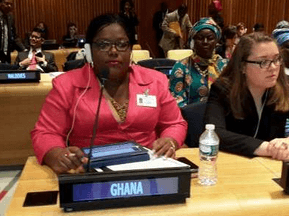Ghana outlines strategy against child marriage

Ghana has outlined a holistic national strategy to combat child, early and forced marriages, to make the practice a high risk marital engagement, and called for collaboration with other African countries.
The holistic national strategy include inter-ministerial action, feeding traditional and community leaders with updated information on the harmful impact of the practices, and collaboration with security agencies for enforcement of laws.
Other engagements would involve non-governmental and civil society organisations to lead national crusade against the practice, distribution of the comprehensive legal frame work, including the Children’s Acts of 1998 that prohibits child marriages.
Nana Oye Lithur, Minister of Gender, Children and Social Protection stated at a breakfast meeting on: “Ending Child Marriage in Ghana and West Africa,” organised on the sidelines of the on-going 60th session of the United Nations Commission on the Status of Women (CSW60) at New York.
The Gender Ministry and its collaborators have also an increased community engagement and dialogue with stakeholders, launch intense media campaigns and distribution of mass media communication materials, documentaries and advertisements to thump the message against child marriages.
The meeting organised by the Gender Ministry was hosted by Ghana’s Permanent Mission to the United Nations in New York, and attended by scores of African Gender Ministers, Development Partners, Diplomatic Community, and development partners including UK, UNICEF, UNDP and civil society organizations.
Nana Oye Lithur noted that the Children’s Act criminalizes child marriages, apart from entrenching it in the Criminal code.
She said Child Marriage was a serious human rights issue which affected the child’s education, health, economic opportunities, security of the community and state and contributes to sexual and physical abuse.
The Gender Minister noted that other holistic strategy included the setting up of Child Marriage Coordinating Unit; the commissioning of an Advisory Committee; the establishment of a network of stakeholders; and development of a national strategic framework.
She said the country had also identified goodwill ambassadors as well as formed network of media allies to champion the campaign.
Nana Oye Lithur said coordinated efforts by various stakeholders towards ending child marriage had been increased, whilst social action, acceptance and visibility around investing in and supporting girls had also been put on the radar.
Statistics indicates that one out of every five girls was likely to marry before reaching 18 years.
“There is also a regional dimension to this, the rural-urban disparity. So a girl in the rural area in Ghana is more likely to get married twice as much as the one in the urban area.
“So it is 36 per cent against 19 per cent,” Nana Oye Lithur said.
The Gender Minister noted that some of the driving factors influencing child marriages included teenage pregnancy, fear of stigmatization, protecting virginity and conforming to traditional norms and customary practices.
Baroness Sandy Verma, Minister for International Development of the United Kingdom, expressed the support of her government for Ghana’s efforts and leadership in galvanizing ECOWAS and the world into action to stop child marriages.
Mr. Cornelius Williams, Associate Director, Child Protection of UNICEF, contributing to the discussion, said the mere passing of laws do not stop the issue of child marriages but the effective implementation of best practices and existing laws were the best antidotes to the issue.
Ms Julia Duncan-Cassell, Liberian Minister of Gender, Children and Social Protection, condemned child marriages and supported Ghana’s call for a regional approach in solving the problem.
She said the perpetrators were likely to move to other areas or countries without effective implementation or checks to carry out their nefarious activities.
“We respect our traditions and culture, but those harmful practices that affect our people and girls must be stopped,” Ms Duncan-Cassell stated.
Mr. Moribadjah Keita, Director of Regional Action to Protect Children in Guinea, supported efforts to stop early marriages through a concerted regional solution since the problem was a common one that required all hands on deck.
Ms Edwidge K. M. Mutale, Permanent Secretary, Ministry of Gender, Zambia said the use of chiefs and other community leaders to tackle the problem had proven to be an effective way of solving the problem of child marriages in Zambia.
Sharing the Zambia experience, she noted that the problem of early or child marriage was more prevalent in the rural areas, where the chiefs and other traditional leaders have a lot of influence, hence the use of chiefs as agents of change.
Mrs Martha Ama Akyaa Pobee, Ghana’s Permanent Representative to the United Nations said “the incidence of conflicts, disasters and emergencies tend to aggravate child marriage.
She said it affected the physical and psychological healthy development of the girl child, while at the same time consigned them to a cycle of poverty and often social isolation.
Mrs Pobee said Ghana was using the international platform to engage donors and partners for the effective implementation of the campaign in Ghana and also serve as a platform for the ECOWAS Ministers and experts to discuss the development and adoption of an ECOWAS resolution on child, early and forced marriage.
Source: GNA
